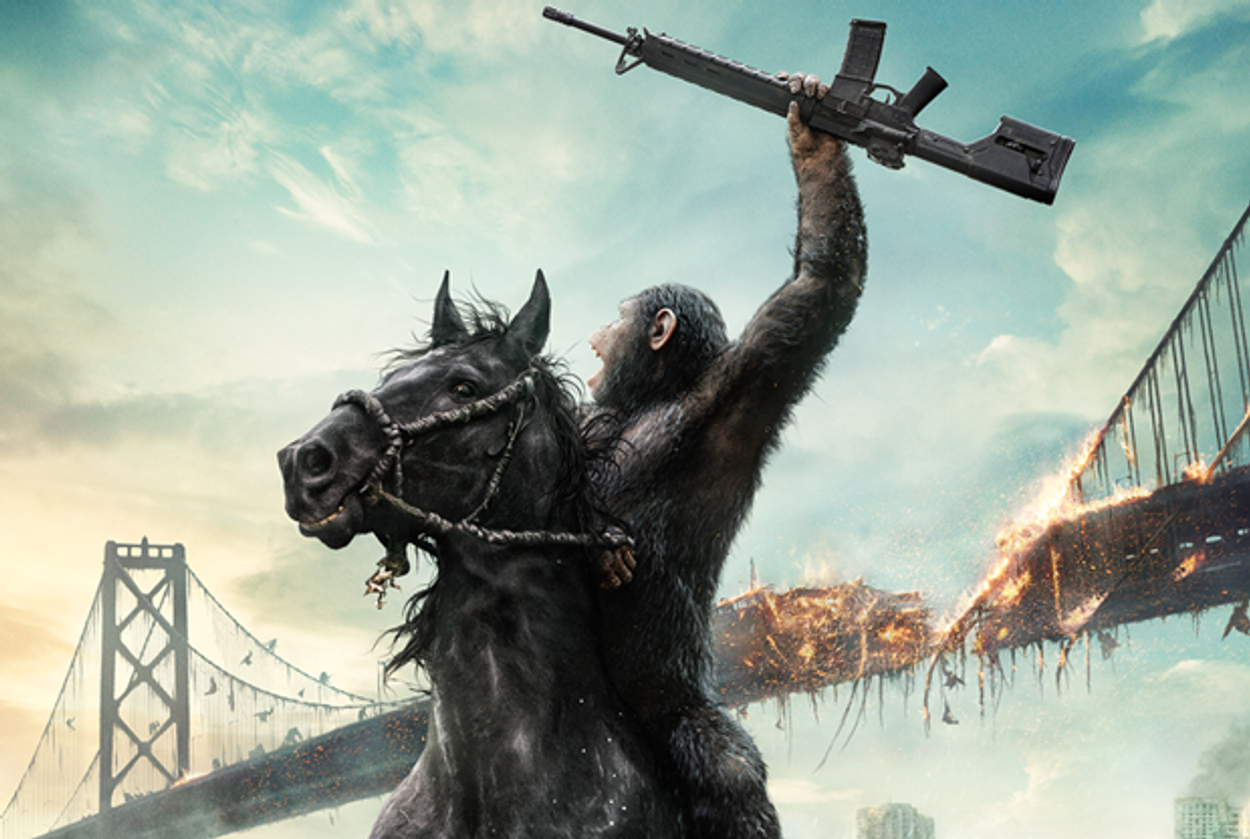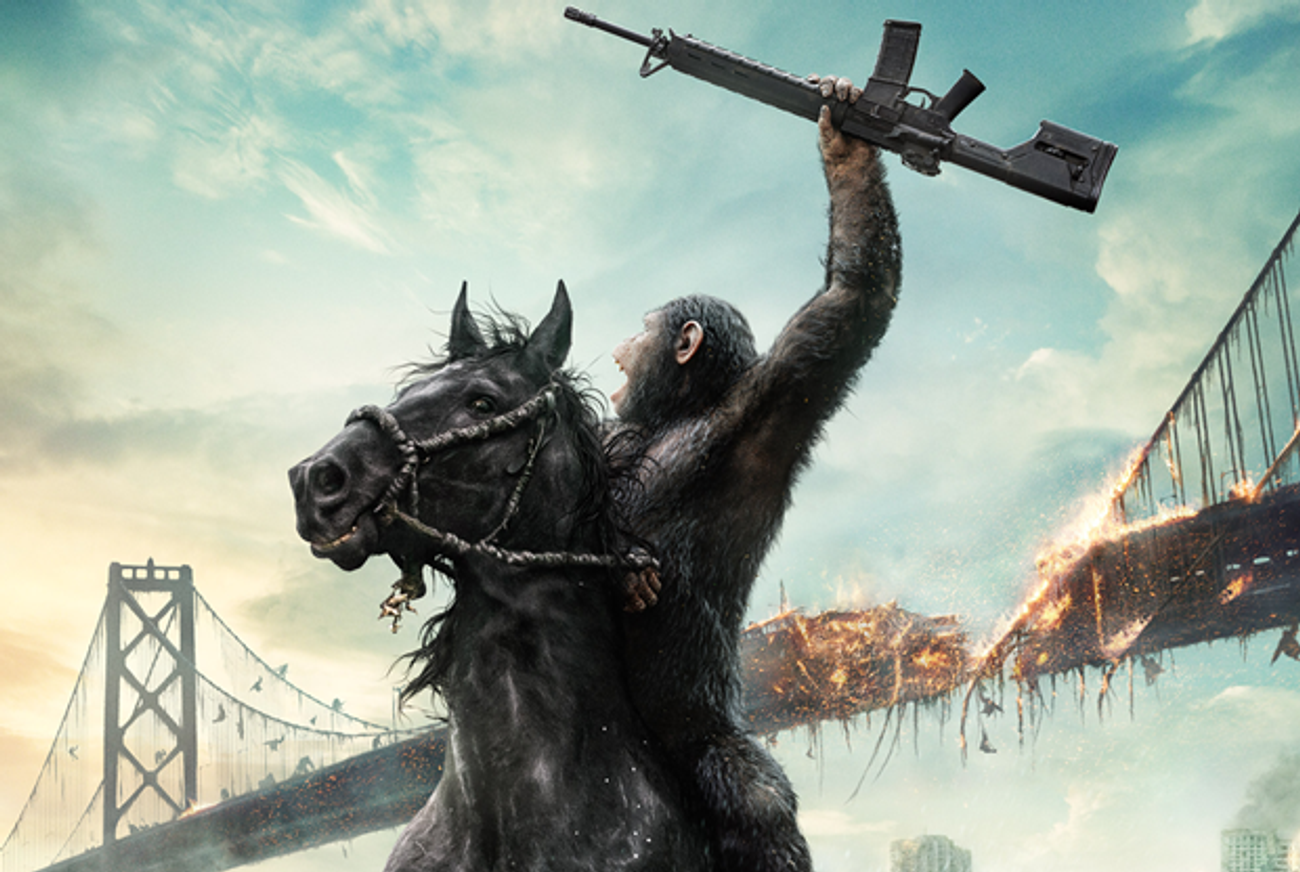Dawn of the Planet of Qasem Suleimani
In Hollywood’s twisted view of hardliners, lessons for our generals, diplomats, and politicians




Dawn of the Planet of the Apes opened this weekend by topping competitors with a whopping $73 million at the box office, putting an exclamation point on a revolution in U.S. foreign policy. A sequel to 2011’s Rise of the Planet of the Apes, Dawn is set in San Francisco 10 years after a plague has killed most of humanity and a band of survivors is poised to make war on a race of super-advanced apes living in the northern Californian forest. In other words, Dawn is a take on U.S. foreign policy, its recent failures, and President Barack Obama’s grand strategy to set the world right. Specifically, it’s about the United States’ nuclear talks in Vienna with the Islamic Republic of Iran.
Don’t believe me? The main plotline of Dawn is that humans are running out of gas and need energy—which sounds an awful lot like the Iranians’ straight-faced rationale for their nuclear program. The humans’ only hope is re-starting a dam that will not only keep the lights on but also allow them to contact other human survivors and thereby re-join the community of humans. The problem is that the dam is located right in the middle of the apes’ territory. The apes don’t trust the humans and worry that they might be even more dangerous with a steady stream of electricity. The apes warn the humans to stay away unless they want war. That is, sometimes it’s the humans who stand in for Iran, and at other times it’s the apes.
Meet Hollywood’s Summertime Inaction Heroes! Click here.
One enlightened human, Malcolm, reaches out to the leader of the apes, Caesar, an impressive figure who, Malcolm later learns, was himself raised by a human (played by James Franco in the earlier film)—“a good man,” Caesar tells him, “like you.” In other words, having spent enough time in the other camp, Caesar knows that the humans have good qualities as well as bad ones: He is the ape Hassan Rouhani, the Iranian president whose time in the West (as a post-graduate student in Scotland), according to some, made him an open-minded reformer.
As trust—a movie keyword, exchanged several times between Malcolm and Caesar—develops between the two primate moderates, their fragile co-existence is soon shattered. The problem is the hardliners. As former New York Times Editor Bill Keller has explained, there are always hardliners on both sides. Iran has the Quds Force, an external operations unit that commits terrorist operations, and the United States has hardliners like former U.N. Ambassador John Bolton. Naturally, the same holds true for the apes and humans in Dawn. Koba is the ape equivalent of Quds Force commander Qasem Suleimani, a fearless military leader primarily motivated by his anger: Suleimani suffered on the frontlines of the Iraq-Iran war, while Koba, a liberated lab animal, suffered at the hands of human researchers. After Koba makes an assassination attempt on Caesar, he wages pre-emptive war on the humans.
Dreyfus—the reference to the affair that inspired Theodor Herzl is hardly insignificant—is the human hardliner played by Gary Oldman. He’s a fairly decent guy, but having lost his entire family in the plague and subsequent bloodshed he is willing to finish off his ape adversaries in the conviction that they are about to kill a lot more humans. His tragic flaw, from the film’s perspective, is that his own traumas have made him unable to distinguish between ape moderates, i.e., men of peace, and hardliners, and so he helps set in motion a big war that is surely destined to be the subject of the sequel. As Caesar and Malcolm embrace at the end of Dawn, they lament what might have been, had they not been outflanked by their hardliners. “We almost made it,” says Caesar.
***
The rebooted Planet of the Apes franchise, then, is as sentimental and pessimistic as the previous iteration of the franchise—but with really fantastic computer-generated graphics and without the absurd monkey costumes and hokey make-up that marred the first go-round of the Apes franchise. Still, there is no forgetting the final scene of the original Planet of the Apes, when Charlton Heston falls to his knees upon seeing the head of the Statue of Liberty and realizes that mankind had all but extinguished itself in a war that almost certainly included a nuclear exchange.
It’s worth recalling that the fear of a large-scale nuclear conflict and consequently the mutually assured destruction of the United States and Soviet Union were major pop culture conceits when the first Planet of the Apes movie was released in 1968. The pop culture industry made films, TV shows, records, comic books, etc., that evinced its distrust of the officials, especially American ones, responsible for handling those weapons. But those cultural products also showed fear of the arms themselves—weapons with a power all their own that would perhaps tempt men to Luciferian heights from which they might unmake the world.
The original Planet of the Apes takes on every component of the 1960s pop culture triumvirate—war, nuclear weapons, and perhaps most important of all, race. Heston plays an astronaut who lands on an unrecognizable planet (which turns out to be a post-apocalyptic Earth) and is rounded up by a gang of gorillas on horseback who throw him into a cage along with other humans. The apes can talk but the humans can’t and neither, temporarily, can Heston who has been wounded in the throat. He’s protected by a compassionate chimpanzee couple who eventually discover that “Bright Eyes,” as they refer to Heston, is capable of communicating.
The fact that Heston, one of the standard-bearers of full-blooded American masculinity—who, not coincidentally, was most famous for his portrayal in The Ten Commandments as the greatest lawgiver of Western civilization—is seen by the apes as a dumb brute is what makes the film’s treatment of race so effective, if ham-fisted. The chimp couple’s excitement to find that Heston can talk is a criticism of the self-congratulatory tone taken by much of the country’s liberal white elite, which often gave the appearance of having just stumbled upon the astonishing fact that African Americans were human beings not unlike themselves. In Planet of the Apes, the joke is that the chimpanzees are amazed that a human is capable of doing what an ape can do—i.e., that a human has humanity. The irony is that the humans themselves came to that discovery too late to keep themselves from killing each other.
In the real world, however, the humans did not destroy themselves in a massive nuclear exchange. The United States was governed by careful men whose memories of World War II—personal and collective—taught them two things: One, war is very dangerous, and to be engaged as a last resort; and two, cultures are often in necessary conflict with each other, and it is important that malign cultures that deny human freedom lose those conflicts.
It is interesting then to contemplate what the producers of the earlier Apes films would have made of the Iranian nuclear weapons program. If the Soviets and Americans were a danger to all mankind, what about a terror-promoting death cult that openly threatens to immolate its opponents? But the new Apes franchise doesn’t see it this way, imagining rather that conflict is driven not by the incommensurate character of different cultures but by each camp’s “hardliners.”
However, the fundamental problem of civilization is not that every society has its moderates and hardliners, but that cultures can disintegrate or go crazy. The problem with Nazi Germany, for instance, was not Hitler alone, nor even the Nazis as a group, but an entire country that had willingly abandoned reason and gone along with the schemes of a group of psychopaths and thugs. The Russians, as the Sting song goes, may love their children, too—but people whose job it was to deal with the Russians understood that the Soviet Union was nothing like America.
We are no longer governed by men and women with this sort of view of the world. Rather, our policymakers are people with little experience in war or even the nature of other cultures at their breaking point. With so little knowledge of that world, our leaders cannot help but conclude that every conflict around the world resembles America’s worst war, its race conflict. From Israel and the Palestinians to French Muslims in revolt and attacking synagogues it’s the same: The oppressor refuses to acknowledge the humanity of those they oppress, and so the oppressed is justified to respond with violence. Thus, the higher the level of violence, the more severe must be the guilt of the oppressor. Once we do see that the other is just like us, the spur to violence is removed. To be sure, there are those, on both sides, who welcome war, and who will agitate for continued violence. These are the hardliners, a danger to us all.
Dawn of the Planet of the Apes is a terrific Hollywood picture, but it’s no substitute for a strategy in how to deal with people who are every bit as human as we are but want things that are bad for us—and probably for them, too. To be clear, the problem is not that Hollywood is selling moviegoers a phony bill of goods about how nations behave and why. It’s that we are governed by a generation whose worldview is a distillation of the collective wisdom of late-20th-century American pop culture. That’s not Hollywood’s problem—it’s ours.
***
To read more analysis by Tablet magazine political columnist Lee Smith,click here.
Lee Smith is the author of The Consequences of Syria.
Lee Smith is the author of The Permanent Coup: How Enemies Foreign and Domestic Targeted the American President (2020).